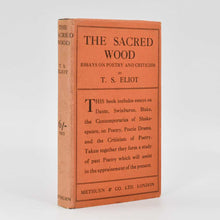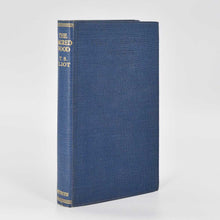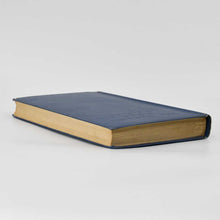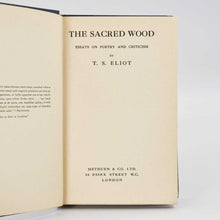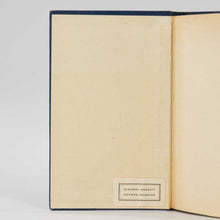
GLENWAY WESCOTT AND MONROE WHEELER'S COPY
ELIOT, T. S. The Sacred Wood. Essays on Poetry and Criticism. London: Methuen. 1920.
8vo. Original blue cloth, lettered in gilt to the spine and to the front board in blind, lower edge of page block untrimmed; pp. [xiv], 155, [1]; from the library of poet and novelist Glenway Wescott and his partner Monroe Wheeler, their book label affixed to the lower edge of the front pastedown, their light annotations in pencil to handful of pages, small bookseller’s printed description pasted to lower edge of the rear free endpaper, in the second issue jacket, in use from 1921, with added subtitle and a couple of changes to the catalogue printed to the rear panel; minor rubbing to lower spine tip, lightly bumped to corners, cloth and gilt sharp, pages crisp and clean; an uncommonly sharp and bright example, in like dustwrapper.
First edition, first impression of the first of Eliot's essay collections, bringing together twenty pieces, including the poet’s most famous and frequently cited essay, "Tradition and the Individual Talent", and the great essay on “Hamlet and his Problems”.
A pleasing association copy from the library of poet and novelist Glenway Wescott and his partner Monroe Wheeler, with their elegant ownership label to the front pastedown. Wescott (1901-1987), who occasionally corresponded with Eliot, lived in Germany and France during the 1920s and 30s, and was at the heart of the ex-patriate literary community in Paris, rubbing shoulders with Pound, Hemingway and Gertrude Stein among others. A model for the character Robert Prentiss in Hemingway's The Sun Also Rises, Stein wrote of him, a little disdainfully (in The Autobiography of Alice B. Toklas [1933]) that "There was also Glenway Wescott but Glenway Wescott at no time interested Gertrude Stein. He has a certain syrup but it does not pour". His partner for more than six decades,Wheeler (1899-1988) was director of publications at the Museum of Modern Art in New York.
The Sacred Wood was the first of a handful of remarkable volumes of literary and cultural essays Eliot published during the 1920s and 30s. Hugh Kenner has written of the young poet’s “incredible fecundity of insight” during these decades, “marshall[ing] into gnomic paragraphs […] that view of the literature of the past which the twentieth century recognizes as peculiarly its own. […] The rays of light are so exactly defined that we are tempted to calculate the position of the sun”.
Gallup A5a.; Hugh Kenner, The Invisible Poet: T. S. Eliot (London: W. H. Allen, 1960).
#2122074





